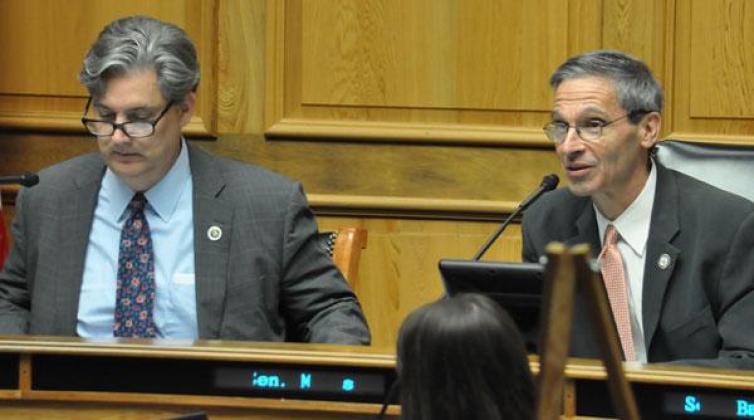
Sen. Dan Claitor, R-Baton Rouge (left) and Sen. Fred Mills, R-New Iberia, listening to testimony Tuesday in Senate Committee on Health and Welfare. (Photo by Sarah Gamard/ Manship School News Service)
The Senate Health and Welfare Committee reported to the full chamber for debate Tuesday bills to create cheaper medicine, to lower obesity rates and to provide more stringent opioid regulations.
Senate Bill 14 by Sen. Jay Luneau, D-Alexandria, expand the legal definition of “auto-injector” to include more than EpiPens, which treat allergy emergencies.
Luneau said his bill could drive the market to make less expensive options more competitive and help down drive prices that recently soared from $100 to around $600 per dose. He said the bill makes no changes to administration of the medication, but allows for the use of more modern technology.
Senate Bill 116 by Sen. Fred Mills, R-New Iberia creates a commission called Work Out Now (WON) to bring the battle against obesity to the local level. Louisiana has the highest adult obesity rate in the nation and the fourth highest obesity rate for children ages 10 to 17.
The state also ranks fifth in the nation for adults with diabetes and fourth in the nation for adults with hypertension.
“We’re at the top in a lot of issues we don’t want to be at the top in,” Mills said, adding that the state Medicaid program alone spent over $98 million in obesity-related payments for its Medicaid covered children and adults in 2014, the last year statistics are available.
Luneau supported Mills’ bill, calling himself “the most gravity-challenged Senator” on the panel.
Senate Bill 96 by Sen. Ronnie Johns, R-Lake Charles fortifies an existing law that essentially ensures Louisiana prescription drug users do not abuse access to those drugs.
The measure provides medical examiners access to overdose information, addiction counselors the ability to see which doctors repeatedly give too many opiates to patients, and a way for Probation and Parole officers to monitor offenders with medically prescribed painkillers and opiates.
Senate Bill 34 by Sen. Gerald Boudreaux, D-Lafayette, changes the definition of “emergency ground ambulance service provider” in recently passed legislation to eliminate confusion.
